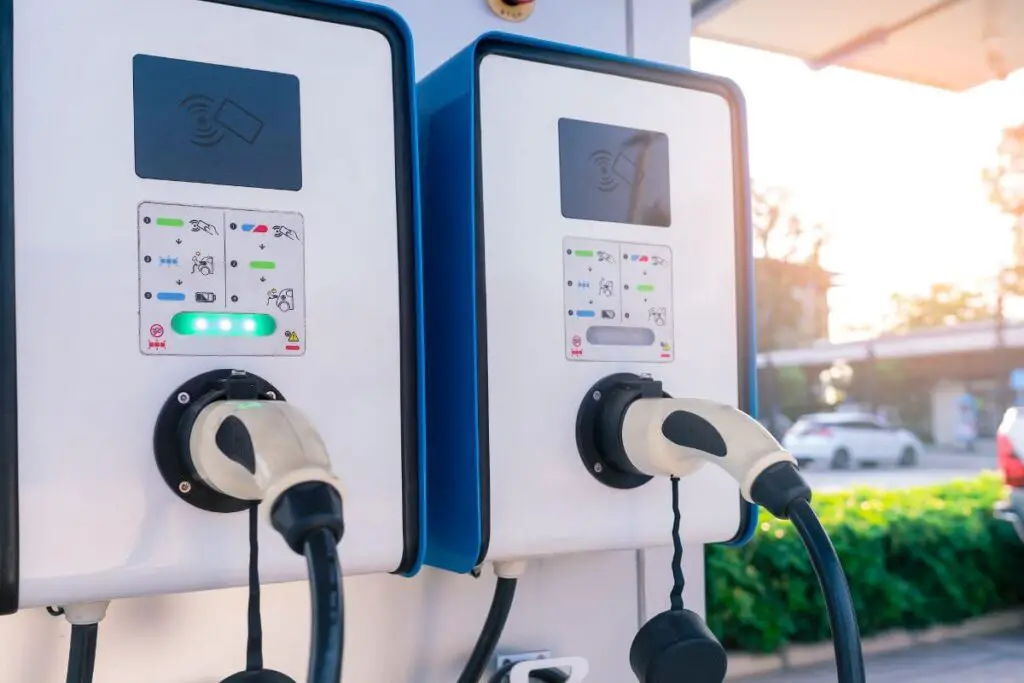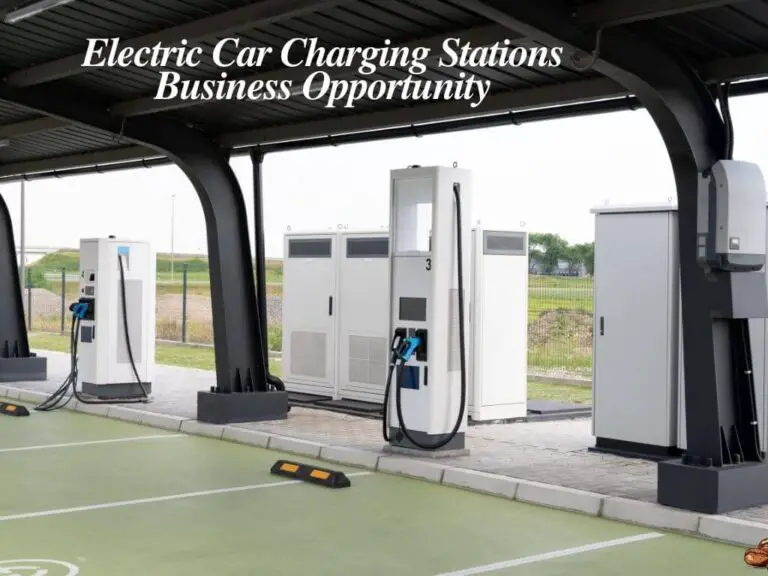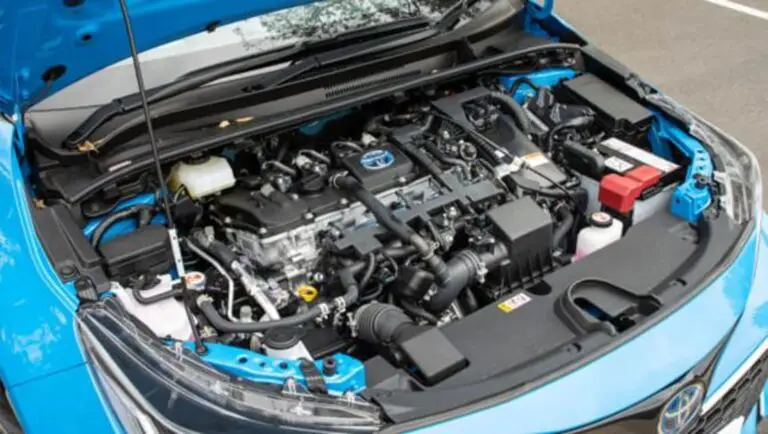Yes, you can charge an electric car with a portable battery. However, it is important to note that using a portable power station to charge an electric car will likely take a long time and may require a higher power output to fully charge the vehicle’s battery.
Can You Charge an Electric Car With a Portable Battery? Charging an electric car with a portable battery is not as simple as charging a cell phone with an external battery.
Understanding Portable Battery Charging For Electric Vehicles

The Rise Of Electric Vehicles (evs) And The Need For Portable Charging Options
Electric vehicles (EVs) are gaining popularity worldwide as a sustainable and eco-friendly alternative to traditional gasoline-powered cars. With the increasing demand for EVs, the need for efficient and convenient charging options has also risen. While EV owners typically rely on charging stations and home charging units, there is a growing interest in portable battery charging for electric vehicles.
Portable battery charging offers several advantages for EV owners. It provides flexibility, allowing users to charge their vehicles even when a charging station is not readily available. Whether it’s on a road trip or in a remote area, portable batteries can come in handy for recharging electric cars. Additionally, portable charging options can be beneficial during power outages or emergencies, ensuring that EV owners can still access a reliable charging source.
How Do Electric Vehicle Batteries Typically Get Charged?
When it comes to charging electric vehicle batteries, there are typically two main options – AC (alternating current) and DC (direct current) charging. AC charging is commonly used for home charging units and public charging stations. It provides a slower charging speed but is suitable for overnight charging or when the vehicle is parked for an extended period.
On the other hand, DC charging offers faster charging speeds and is commonly found at fast charging stations along highways or major roadways. These fast charging stations can provide a significant amount of power to charge the vehicle battery quickly. However, DC charging stations may not be readily available in all areas, making portable battery charging an attractive alternative for EV owners.
Exploring The Potential Of Portable Batteries For Charging Evs
As the technology for portable batteries continues to advance, there is great potential for using them to charge electric vehicles. Portable batteries, also known as power stations, are designed to store and provide electricity on the go. These compact and lightweight devices can be easily transported and can hold a substantial amount of energy.
One of the primary considerations when using portable batteries for charging EVs is the battery capacity. A higher-capacity battery will provide more charging cycles, allowing for multiple charges of an electric vehicle. Additionally, the battery should have the capability to provide the necessary voltage and current for a safe and efficient charge.
While portable battery charging for electric vehicles is an appealing concept, there are certain limitations to consider. The charging speed of portable batteries may not be as fast as dedicated fast charging stations, resulting in longer charging times. Moreover, the energy capacity of portable batteries may not be sufficient to fully charge larger EVs with higher battery capacities.
In conclusion, portable battery charging options for electric vehicles offer convenience and flexibility. They can serve as a reliable backup charging source and provide a solution for EV owners in remote areas or during power outages. However, it’s essential to consider the battery capacity and charging speed when opting for this charging method. With advancements in technology, portable battery charging for electric vehicles will continue to evolve, offering more efficient and practical solutions for EV owners.
Exploring The Feasibility Of Charging An Electric Car With A Portable Battery
Exploring the feasibility of charging an electric car with a portable battery opens up possibilities for convenient charging on the go. Whether you’re planning a road trip or find yourself in need of a quick charge in a remote area, understanding the potential of using a portable battery for electric vehicle (EV) charging is essential. In this article, we’ll delve into different types of portable batteries, analyze their power capacity, and examine the conversion and compatibility factors for charging EVs.
Can You Charge an Electric Car With a Portable Battery? When it comes to portable batteries for charging electric cars, it’s important to consider their types and specifications. Here are the main types of portable batteries:
| Type | Description |
|---|---|
| Lithium-ion | Batteries commonly used for portable charging due to their high energy density and longer lifespan. |
| Nickel-Metal Hydride (NiMH) | Less common but still used for some portable charging applications. They have a lower energy density compared to lithium-ion batteries. |
The power capacity of a portable battery determines how much charge it can provide to an electric car. It’s crucial to ensure that the battery’s capacity is sufficient for your EV’s needs. Here are a few factors to consider:
- Battery Capacity: This is usually measured in watt-hours (Wh) or ampere-hours (Ah). A higher capacity means more energy stored in the battery.
- Output Power: The maximum power that the portable battery can deliver to the EV. Higher output power allows for faster charging.
- Charging Rate: The rate at which the battery can be charged. Faster charging rates are desirable for shorter charging times.
Charging an electric car with a portable battery requires converting the battery’s DC (direct current) output to the required AC (alternating current) input for the EV. Factors to consider for a successful conversion and compatibility include:
- Inverter Efficiency: The efficiency of the inverter in converting DC to AC power. Higher efficiency means less wasted energy during conversion.
- EV Charging Standards: Ensuring that the portable battery and the EV comply with the same charging standards, such as CHAdeMO or CCS, for seamless compatibility.
- Connector Types: Matching the connectors of the portable battery and the EV’s charging port for a secure and reliable connection.
By considering these factors, you can assess the feasibility of using a portable battery to charge your electric car. Remember to always refer to the manufacturer’s specifications and consult with professionals for guidance.

The Pros And Cons Of Charging An Electric Car With A Portable Battery
Can You Charge an Electric Car With a Portable Battery? When it comes to charging an electric car, most people immediately think of using dedicated charging stations or installing a home charging infrastructure. However, portable battery charging is emerging as a viable alternative for EV owners. In this section, we will evaluate the pros and cons of charging an electric car with a portable battery.
Benefits Of Portable Battery Charging For Evs
Portable battery charging offers several advantages for electric vehicle owners. Let’s take a closer look at some of these benefits:
Convenience and Flexibility of Charging Anywhere
One of the biggest advantages of portable battery charging is the convenience and flexibility it provides. With a portable battery, you can charge your electric car anywhere, regardless of the availability of charging stations. This is especially beneficial for individuals who frequently travel long distances or live in areas with limited charging infrastructure. Additionally, portable battery charging allows EV owners to charge their vehicles at home, work, or any other location with a standard electrical outlet.
Portable Charging as a Backup or Emergency Solution
Another benefit of portable battery charging is its usefulness as a backup or emergency solution. In case of power outages or unforeseen circumstances, a portable battery can serve as an alternative charging method to keep your electric car running. This can provide peace of mind for EV owners and ensure that they are not left stranded in critical situations.
Limitations And Challenges Of Charging An Electric Car With A Portable Battery
While portable battery charging offers convenience and flexibility, it also comes with some limitations and challenges. Let’s explore these factors:
Power Capacity Limitations and Range Anxiety
One significant limitation of portable battery charging is the power capacity of the battery itself. Portable batteries typically have a limited capacity compared to dedicated charging stations or home charging infrastructure. This can result in longer charging times or the need for multiple charging cycles to fully recharge an electric vehicle. Additionally, the limited power capacity can contribute to range anxiety, especially for EV owners planning longer distance trips.
Time Constraints and Charging Speed
Another challenge of portable battery charging is the time constraints and charging speed. While portable batteries have advanced over the years, they still may take longer to charge an electric vehicle compared to dedicated charging stations. This can be a significant drawback for individuals with limited time or those who depend on fast charging options for their daily commute or travel needs.
In conclusion, evaluating the pros and cons of charging an electric car with a portable battery is essential for EV owners. While portable battery charging offers convenience, flexibility, and backup solutions, it also has limitations in terms of power capacity and charging speed. Ultimately, the decision to use a portable battery for charging depends on individual needs, travel patterns, and access to charging infrastructure.
Portable Battery Charging Solutions In The Market
Reviewing Existing Portable Battery Charging Systems For Evs
Can You Charge an Electric Car With a Portable Battery? When it comes to charging an electric car with a portable battery, there are a variety of options available in the market. These portable battery charging systems offer convenience and flexibility, allowing EV owners to recharge their vehicles on the go.
One popular brand in the market is the EcoFlow Delta Pro, which has gained praise for its impressive features and performance. The State Of Charge YouTube channel provides an in-depth overview of the EcoFlow Delta Pro, including its key specifications, usage with both AC and DC charging, and even its solar charging capabilities.
Another notable option is the VEVOR Portable EV Charger, which is known for its reliability and portability. Lectron V‑Box EV Charging Station is also a great choice, offering convenience and ease of use. These portable chargers are reviewed and showcased on various platforms, providing valuable insights for potential buyers.
Comparing Different Brands And Models
Comparing different brands and models is essential to find the best portable battery charging solution for your electric car. The Daily Automotive YouTube channel offers detailed reviews of various portable chargers, allowing viewers to compare their features and performance side by side.
One important consideration when comparing different brands and models is the charging time. How long does it take to charge an electric car with a portable charger? Pod Point, a leading provider of electric vehicle charging solutions, provides a comprehensive guide on their website which outlines the charging times for different types of EVs.
Additionally, it is crucial to consider the compatibility of the portable charger with your specific electric car model. While some portable battery chargers are designed to work with a wide range of EVs, others may have limitations. Therefore, it is recommended to check the compatibility before making a purchase.
Analyzing The Features And Technical Specifications
When analyzing the features and technical specifications of portable battery charging systems, there are several key aspects to consider. One of the most important factors is the power output of the charger, which determines how quickly it can recharge the EV’s battery.
Moreover, the charging capacity of the portable battery is crucial. For example, the EcoFlow Delta Pro offers a high-capacity battery, allowing for multiple charges without the need for frequent recharging.
Portability and ease of use are also significant considerations. Portable chargers like the VEVOR Portable EV Charger and Lectron V‑Box EV Charging Station are designed to be compact and lightweight, making them convenient for on-the-go charging.
Another essential feature to consider is the safety mechanisms integrated into the charger. Overcurrent protection, overvoltage protection, and short circuit protection are vital to ensure the safety of both the charger and the electric car during the charging process.
In conclusion, when looking for portable battery charging solutions for your electric car, it is important to review existing systems, compare different brands and models, and analyze the features and technical specifications. By doing so, you can find the perfect portable charger that meets your charging needs and offers convenience and efficiency on the go.
The Future Of Portable Battery Charging For Electric Vehicles
Advancements And Innovations In Portable Battery Technology
Portable battery technology is rapidly advancing, opening up new possibilities for charging electric vehicles on the go. With the increasing popularity of electric cars, innovators are continuously developing smaller, more efficient, and powerful portable battery solutions. These batteries are designed to provide a reliable and convenient charging option for EV owners, allowing them to charge their vehicles anytime and anywhere.
One major advancement in portable battery technology is the development of high-capacity lithium-ion batteries. These batteries offer significant energy storage capabilities in a compact form factor, making them ideal for portable charging applications. Companies like Tesla and EGO Nexus are leading the way in this field with their portable power stations and solar generators, which can charge electric cars with ease.
Another innovation in portable battery technology is the integration of advanced charging algorithms and smart management systems. These technologies ensure efficient and optimized charging processes, maximizing the battery’s capacity and extending its lifespan. Some portable power stations even offer fast DC charging capabilities, allowing EV owners to charge their vehicles in a fraction of the time compared to traditional charging methods.
Furthermore, advancements in renewable energy technologies have also contributed to the evolution of portable battery charging for electric vehicles. Solar charging options, such as the EcoFlow Delta Pro, enable EV owners to harness the power of the sun to charge their vehicles. This combination of portable battery technology and renewable energy sources creates a sustainable and environmentally-friendly charging solution.
Potential Applications And Integration Of Portable Battery Charging In Ev Infrastructure
The integration of portable battery charging in EV infrastructure holds immense potential for enhancing the accessibility and convenience of electric vehicle charging. These portable battery solutions can be strategically placed in areas with limited charging infrastructure or used as backup power sources during emergencies or power outages.
By incorporating portable battery charging stations in public spaces, such as parking lots, shopping centers, and rest areas, EV owners can have a reliable and convenient option for charging their vehicles while on the move. Additionally, these portable charging stations can be easily deployed in remote locations or during events where access to electricity may be limited.
Furthermore, the potential integration of portable battery charging with existing EV charging networks can help alleviate strain on the grid during peak charging periods. By utilizing the stored energy in portable batteries, the demand for electricity can be better managed, ensuring a more stable and efficient charging experience for EV owners.
The Role Of Portable Battery Charging In Accelerating Electric Vehicle Adoption
Portable battery charging has the potential to play a significant role in accelerating the adoption of electric vehicles. One of the main challenges in transitioning to electric transportation is the availability and accessibility of charging infrastructure. Portable battery solutions address this challenge by providing a flexible and convenient charging option, eliminating range anxiety and enabling longer journeys.
Moreover, portable battery charging can broaden the appeal of electric vehicles to a wider range of consumers, including those who live in apartments or lack access to dedicated charging stations. With portable power stations, EV owners can charge their vehicles from the comfort of their homes or any location with access to a power source.
Additionally, the integration of renewable energy sources in portable battery charging further promotes sustainable transportation. By utilizing solar power or other renewable energy sources, EV owners can reduce their carbon footprint and contribute to a cleaner and greener future.
In conclusion, the future of portable battery charging for electric vehicles is filled with exciting advancements and opportunities. From innovations in battery technology to the potential integration with existing infrastructure, portable battery charging has the potential to revolutionize the way we charge our electric vehicles and accelerate their widespread adoption.
Conclusion
Charging your electric car with a portable battery is indeed possible, providing a convenient and flexible solution for on-the-go charging. While it’s important to note that charging times may be longer and power requirements may vary, portable power stations can be a viable option for emergency situations or when access to a traditional charging station is limited.
It’s always recommended to consult the manufacturer’s guidelines and ensure that the portable battery is compatible with your specific electric vehicle model for optimal performance. With the advancements in technology and the increasing demand for electric vehicles, the future of portable charging solutions looks promising.
Frequently Asked Questions
How Long Does It Take To Charge An Electric Car With A Portable Charger?
On average, it takes a portable charger approximately 8-12 hours to fully charge an electric car.
Can You Charge Tesla With Portable Battery?
Yes, it is possible to charge a Tesla with a portable battery.
How Do You Charge An Electric Car When Traveling?
To charge an electric car when traveling, use the car’s navigation system or route-planning apps like PlugShare, A Better Route Planner, or Chargeway to locate charging stations along your planned route. Some EVs, like Tesla and Mercedes, even provide advice on when to charge.







